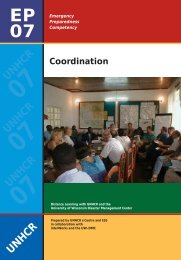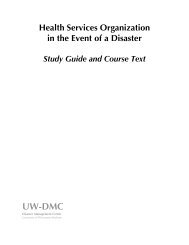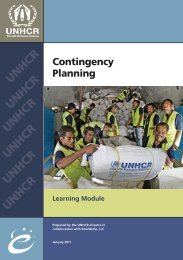Managing External Relations - Disaster Management Center ...
Managing External Relations - Disaster Management Center ...
Managing External Relations - Disaster Management Center ...
Create successful ePaper yourself
Turn your PDF publications into a flip-book with our unique Google optimized e-Paper software.
Group Cycles<br />
Chapter 2<br />
Most groups go through fairly predictable phases in their work together. These phases or cycles<br />
exist to some degree even in emergency situations and must be understood and accommodated.<br />
The acceptance of these phases makes it easier to develop your workplan and to recognise problems.<br />
The phases may include:<br />
Social interaction — Pleasantries are exchanged which may be unrelated to the<br />
group’s main purpose but serve to unify members.<br />
Information seeking — The group answers the questions related to its activities, such<br />
as reviewing the agenda or workplan.<br />
Establishing structures — The group pursues activities to accomplish its objectives.<br />
Certain group members may assume control, so it is best to encourage exchange of<br />
roles, such as discussion leader or note taker, etc.<br />
Constructive work — If the previous three areas are not well covered, undertaking<br />
the core activities may be difficult. Some people may have hidden agendas, feel<br />
alienated or not understand what is going on, especially in the chaotic context of<br />
emergency operations.<br />
Completion — A summary or decision on next steps gives a feeling of closure and<br />
emphasises a feeling of forward motion or progress on the problems at hand.<br />
Some stages of group development occur over many meetings, and some have characteristics<br />
that facilitators should be aware of in these stages. They are as follows:<br />
Forming — Members try to find their place within the group. There may be suspicion<br />
and anxiety resulting in cautious and restrained participation. People may have preconceived<br />
notions about others in the group. Only minimal work may be accomplished.<br />
Storming — Members try to establish individuality. Defensiveness and competition<br />
may surface resulting in resistance to group tasks. Sub-groups may form in support of<br />
certain positions.<br />
Norming — Members focus more energy on the group’s objectives. They begin<br />
to exhibit more co-operation and increasingly share their feelings and thoughts.<br />
Group cohesiveness is achieved. Moderate amounts of work are accomplished.<br />
Performing — Members have insights into personal and interpersonal processes.<br />
Conflicts and problems are more easily resolved. Significant work is accomplished.<br />
Adjourning — Members exhibit behaviours related to disengagement from the group,<br />
recognising participation and achievement and saying good-bye to each other.<br />
Do the above cycles and stages generally match your experiences with<br />
working in groups? How might they differ or change in emergencies?<br />
EP<br />
04<br />
21








